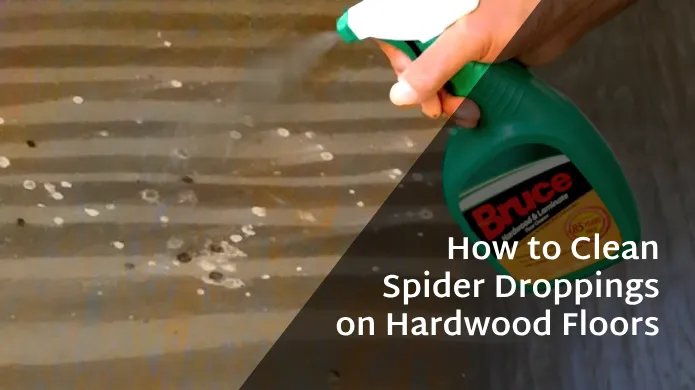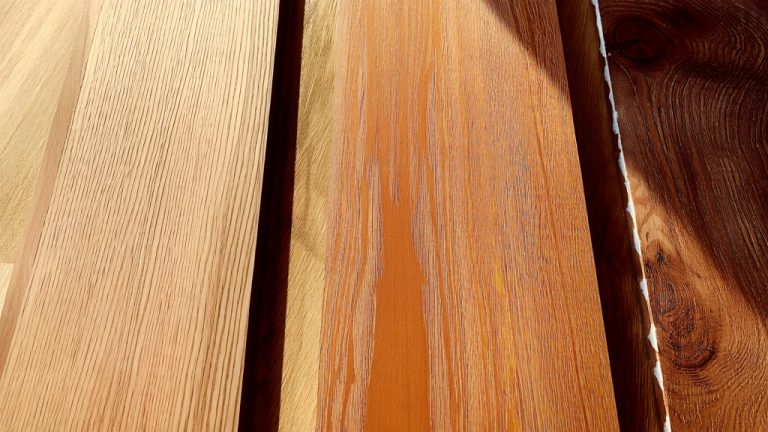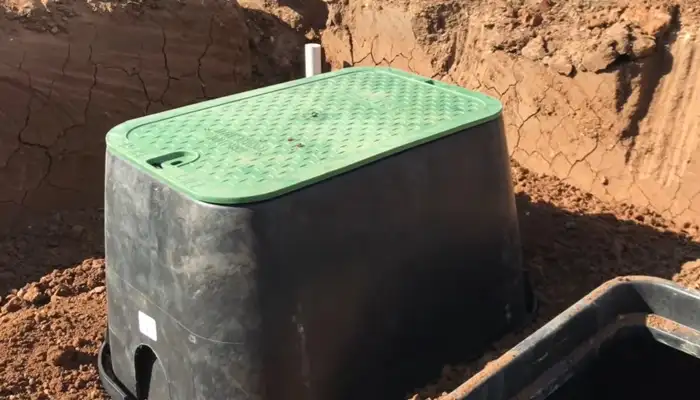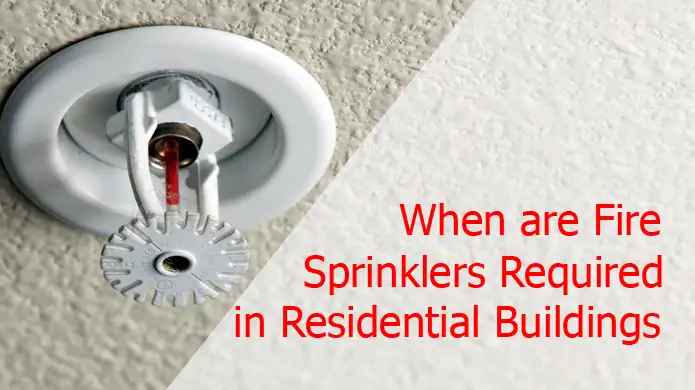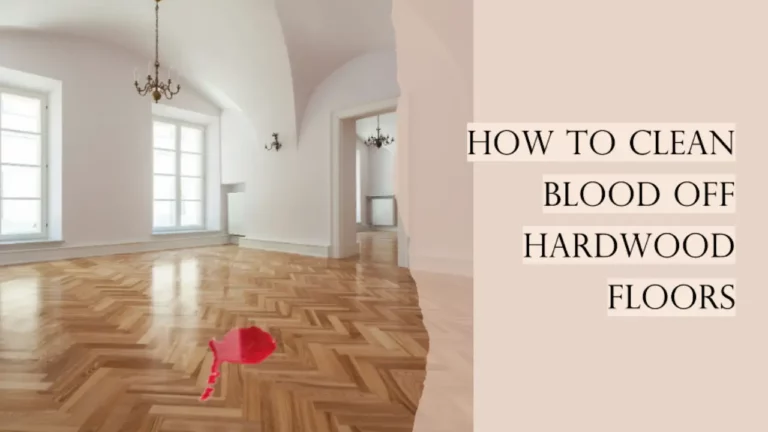How to Clean Spider Droppings on Hardwood Floors: 7 DIY Steps [Effective]
Have you ever walked into a room and noticed small, dark spots on your hardwood floor? You might have thought it was dirt or dust, but upon closer inspection, you realize it’s spider droppings.
Many homeowners have to deal with this pesky problem, but there are ways to clean and prevent spider droppings on your hardwood floors.
To clean spider droppings from hardwood floors, use a vacuum cleaner or broom to remove the loose poop. After that, wipe the affected area with a cleaning solution, applying light pressure to remove the spider droppings.
Rinse the cloth or sponge and wipe the floor with clean water to remove any residue. Allow the floor to air dry completely before stepping on it. We’re getting into the details of tackling those spider droppings, so keep reading on.
How to Clean Spider Droppings on Hardwood Floors: The Ultimate Guide
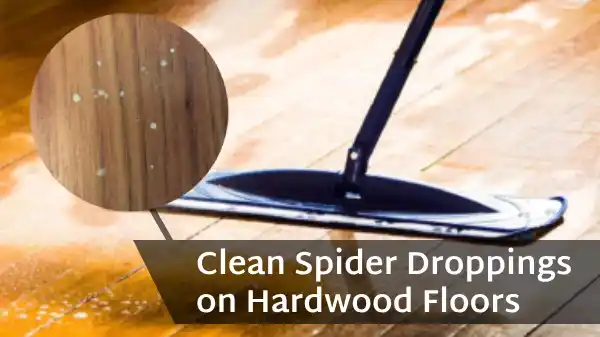
By following these steps, you can have your hardwood floors looking clean and spider-dropping-free.
Step#1: Gather Supplies
Step#2: Remove Loose Debris
Step#3: Prepare a Cleaning Solution
Step#4: Dampen a Cloth Or Sponge
Step#5: Clean the Affected Area
Step#6: Rinse the Area
Step#7: Dry the Floor
Let’s explore this in more detail.
Step#1: Gather Supplies
To clean spider droppings, you will need a vacuum cleaner with a brush attachment or a broom to remove loose debris. Also, you’ll need a soft cloth or sponge to clean the floor, mild dish soap, warm water, a bucket to prepare the cleaning solution, and a clean towel to dry it.
Ensure you have gloves and a dust mask to protect yourself from potential allergens or contaminants.
You should ensure the vacuum cleaner or broom you choose has soft bristles or a brush attachment to avoid scratching the hardwood floor surface.
Also, select a mild dish soap that is safe for use on hardwood floors. Avoid using harsh chemicals or abrasive cleaners, as they can damage the wood. Having all the supplies ready will make cleaning more efficient and convenient.
Step#2: Remove Loose Debris
Sweep up any loose bits and bobs that may have accumulated on the ground before you tackle the remnants left by our four-legged friends.
You can use either a broom or a vacuum for this task, but ensure that the broom has soft bristles to avoid scratching the hardwood floor. Be gentle when sweeping to avoid spreading debris around or pushing it into cracks and crevices.
It’s a good idea to wear protective gloves and a dust mask to avoid any potential allergens or contaminants that may be present in the spider droppings or webs. Take your time and inspect the area carefully to ensure that you have removed all loose debris.
Step#3: Prepare a Cleaning Solution
To prepare a cleaning solution for spider droppings on hardwood floors, fill a bucket with warm water and add mild dish soap. It’s best to stay away from harsh chemicals that can damage the hardwood. Instead, opt for a gentle solution that effectively removes the spider droppings and any other dirt or debris on the floor.
Mix the solution gently until it forms a soapy solution. You don’t want to create too many suds, as this can leave a soapy residue on the floor. Once your cleaning solution is ready, move on to the next step in the cleaning process.
Step#4: Dampen a Cloth Or Sponge
As you get ready to tackle the next step in restoring your beautiful flooring, grab a soft cloth or sponge and dip it into the gentle, soapy solution you’ve created.
Make sure to wring out any excess liquid so the cloth or sponge is only damp and not dripping. This will prevent any water damage to your hardwood floors.
Step#5: Clean the Affected Area
Now that you’ve dampened your cloth or sponge, it’s time to tackle those stubborn spider droppings on your hardwood floor.
To start, gently scrub the area of the dark spot with your damp cloth or sponge, applying light pressure to avoid scratching or damaging the finish. If the droppings are particularly stubborn, try letting the damp cloth or sponge sit on the affected area for a few minutes to loosen the residue before scrubbing again.
Step#6: Rinse the Area
After scrubbing the affected area with a damp cloth or sponge, rinse away any remaining soap residue to ensure a clean and streak-free finish on your beautiful flooring.
Remember to use clean water to avoid dirt or debris on the floor. You can also wring out the cloth or sponge to remove excess water before rinsing the area.
When rinsing the area, make sure to cover the entire affected spot, as well as a small area around it. This will ensure that all soap residue is removed.
Step#7: Dry the Floor
Carefully dry the area after rinsing to prevent any moisture from seeping into the wood and causing damage to your beautiful hardwood floors. Use a clean towel and gently pat the area until all excess water is removed.
Don’t forget to check for hidden areas where water might lurk, such as in between floorboards or underneath furniture. You’ve got to ensure that the floor is completely dry before moving on to any other task.
Even a small amount of moisture left behind can lead to warping or buckling of the wood, which can be very costly to fix. So take your time and thoroughly dry the area before moving on to the next step.
How to Prevent Spider Droppings on Your Hardwood Floor?
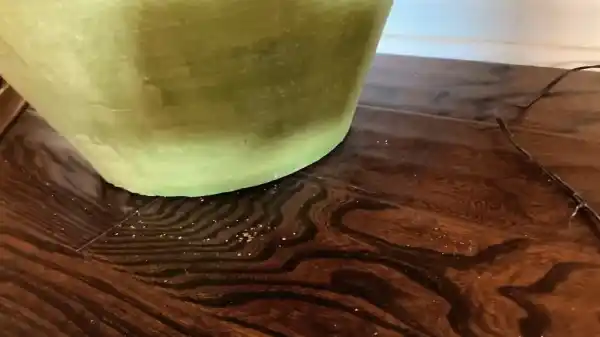
To keep spider droppings off your hardwood floor, you can do a few things to keep these creepy crawlies at bay. Here is a quick overview:
1. Keep Your Home Clean
2. Reduce Clutter
3. Use Spider Repellents
Now, let’s get into more detail:
1. Keep Your Home Clean
You’ll want to maintain a tidy living space, paying special attention to nooks and crannies where eight-legged friends might spin their webs.
Regular cleaning is key to preventing spider droppings on hardwood floors. Vacuum or sweep regularly to remove dust, debris, and potential food sources that may attract spiders.
Cleaning up any spider droppings as soon as you notice them is essential. Use a damp cloth or paper towel to wipe up the droppings, being careful not to spread them around.
Once you’ve removed the droppings, sanitize the area with a disinfectant spray or cleaning solution.
Keeping your home clean and removing spider droppings immediately can help prevent future infestations and maintain a healthy living environment.
2. Reduce Clutter
Declutter your home to create a spider-free sanctuary where you can breathe easy and relax without fear of eight-legged intruders lurking in the shadows. Spiders are attracted to cluttered areas with plenty of hiding spots.
Removing unnecessary items and organizing your storage areas can significantly reduce the number of spiders in your home. Start by going through each room and removing anything you no longer need or use. This includes old magazines, clothes no longer fit, and broken or unused items.
Once you’ve cleared out the clutter, organize the remaining items in a way that makes sense for you.
Use storage bins, shelves, and cabinets to keep everything in its place and avoid leaving piles of items on the floor. By reducing the clutter in your home, you’ll create a more comfortable living space and make it less inviting for spiders to make their home there.
3. Use Spider Repellents
If you’re looking for a more natural way to keep spiders out of your home, consider using essential oils like peppermint or citrus as spider repellent.
These oils are known to be unpleasant to spiders and can be diluted with water to create a spray that can be used in corners, entry points, and areas prone to spider activity.
However, you need to note that not all spider species are repelled by the same oils, so it may take some experimentation to find the right one for your home.
Here are some bullet points to keep in mind when using natural spider repellents:
- Essential oils should be diluted properly before use to avoid damaging or irritating surfaces.
- Repellents should be used consistently to maintain their effectiveness.
- Some essential oils may have a strong scent that may not appeal to everyone.
- If you have pets, make sure to use oils that are safe for them or keep them away from treated areas.
What does spider poop look like?
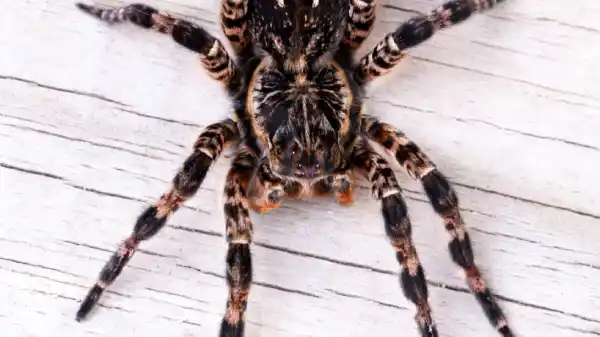
Spider poop can appear differently depending on the spider species and their diet. Typically, it appears as small, dark-colored specks or pellets, similar in size and shape to grains of pepper or fine granules.
The texture can range from dry and solid to slightly moist or sticky, depending on the spider’s diet and the humidity of the environment.
Spider droppings may also contain other debris, such as insect remains or bits of webbing, giving them a slightly different appearance.
Can hydrogen peroxide remove spider-dropping stains from hardwood floors?
Due to its bleaching and disinfecting properties, you can remove spider-dropping stains with hydrogen peroxide from hardwood floors.
To use, dilute with water to create a mild solution and dab onto the stained area with a clean cloth or sponge, being careful not to oversaturate the wood.
Allow the hydrogen peroxide solution to sit briefly before wiping it away with a clean, damp cloth. Repeat as necessary until the stain is fully removed. Acting quickly is key to preventing potential staining or damage to the hardwood surface.
Can vinegar keep spiders away and protect hardwood flooring from spider droppings?
Vinegar can effectively keep spiders away from your home and protect your hardwood flooring from spider droppings. Its strong odor is a natural repellent for spiders, discouraging them from entering areas treated with vinegar.
Also, vinegar’s acidic properties make it an effective cleaning agent for removing spider droppings from hardwood flooring without causing any damage to it.
Using vinegar as a natural spider repellent is an eco-friendly and cost-effective way to protect your home from these unwanted guests.
Quickly Clean Spider Droppings on Hardwood Floors with Ease
Now you can clean spider droppings off your hardwood floors. Remember to follow the step-by-step guide mentioned above and avoid using harsh chemicals.
Hydrogen peroxide can effectively remove spider-dropping stains, and vinegar serves as a natural repellent for spiders while protecting your hardwood flooring.
These simple steps can help you maintain a clean and healthy living space, ensuring that your hardwood flooring stays in good condition for a long time.

